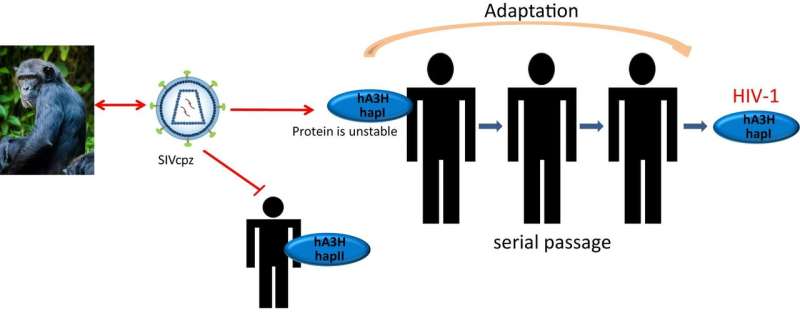Anti-virus protein in humans may resist transmission of HIV-1 precursor from chimps

In humans, an anti-virus protein known as APOBEC3H may defend against cross-species transmission from chimpanzees of the virus that gave rise to HIV-1. Zeli Zhang of Heinrich-Heine-Universität Düsseldorf, Germany, and colleagues present this finding in a new PLOS Pathogens study.
APOBEC3H, or A3H, is one of several anti-viral proteins known as A3s that repress replication of lentiviruses, a genus of viruses that includes HIV-1. HIV-1 originated when chimpanzee strains of simian immunodeficiency virus (SIVcpz) spread to humans. However, few studies have explored the effects of human A3s on SIVcpz.
In the new study, Zhang and colleagues investigated how A3 proteins in both chimpanzees and humans impact SIVcpz. They infected cells from a laboratory cell line with SIVcpz strains in the presence of different A3s. Using a novel method, the SIVcpz viruses had been genetically modified to emit light under certain conditions, enabling the researchers to quantify their infectivity in the cells.
The researchers found that a human A3 protein known as A3H haplotype II strongly inhibited SIVcpz. This was due to A3H's resistance to SIVcpz proteins known as Vifs, which fight back against A3s. A3H can occur in different forms, and other forms of human A3H demonstrated similar activity against SIVcpz.
Using genomic sequencing data from the Great Ape Genome Project, the research team also found that human A3H has a wider range of different possible forms than does chimpanzee A3H. Further experiments showed that Vif proteins from SIVcpz and gorilla SIV were capable of degrading chimpanzee A3H, but not A3H haplotype II.
Overall, these findings suggest that human A3H may protect against transmission of SIVcpz from chimpanzees to humans. Thus, transmission of SIVcpz strains that gave rise to HIV-1 may have begun in people with unstable forms of A3H.
More information: Zhang Z, Gu Q, de Manuel Montero M, Bravo IG, Marques-Bonet T, Häussinger D, et al. (2017) Stably expressed APOBEC3H forms a barrier for cross-species transmission of simian immunodeficiency virus of chimpanzee to humans. PLoS Pathog 13(12): e1006746. doi.org/10.1371/journal.ppat.1006746


















